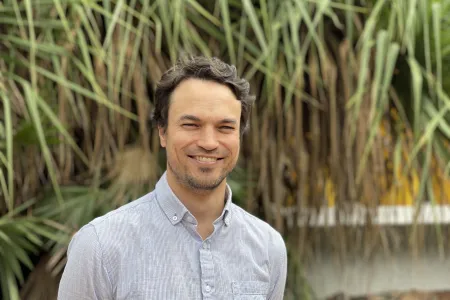News
ARC fellowship a new milestone for CDU’s research portfolio
Charles Darwin University (CDU) researcher Dr Clément Duvert recently became the first Northern Territory recipient of the Australian Research Council (ARC)’s Discovery Early Career Researcher Award fellowship.
The prestigious fellowship will fund Dr Duvert’s research into the greenhouse gas emission of tropical streams in Northern Australia for three years.
Dr Duvert, from the Research Institute for the Environment and Livelihoods (RIEL), aims to quantify the amount of greenhouse gas leaked from streams in the Top End and North Queensland to help inform carbon budgeting and gas abatement policies in Australia.
“Some of the carbon that we thought was stored in our ecosystems is actually leaking out of soils and ending up in streams and rivers. Once there, it is then released to the atmosphere as carbon dioxide or methane through the turbulence of streams,” Dr Duvert said.
“My research quantifies the amount of carbon that is released from streams, which could have implications for climate change mitigation strategies.”
According to Dr Duvert, although reforestation could combat climate change, some percentage of the carbon dioxide absorbed by trees could still be leaked back to the atmosphere via streams, rivers and wetlands.
“With all the rainfall we get here in the wet season, this process of gas emission from streams can be particularly important in the tropics, which is why my project is focussed on this region,” he said.
“To measure and map out the carbon dioxide and methane leaked, I will be using gas sensors and injection experiments to quantify the turbulence in 100 to 150 streams across the region.”
The result from his research will contribute to the better alignment of government policies.
“It’s important to know how much carbon dioxide is stored in the ecosystem at a national and international scale,” Dr Duvert said.
Receiving the ARC fellowship is a big step forward for both Dr Duvert’s research development and CDU’s research portfolio.
“It’s a huge opportunity and I’m very humbled and excited to receive the fellowship. It means I will have enough support to continue my research and collaborating with colleagues in Australia and overseas,” he said.
“It’s also putting CDU on the map and I hope there will be more ARC fellowships in the future.”
With more than $450,000 in fellowship funding for three years, Dr Duvert plans to recruit a new PhD student to assist him in this research project.
“I hope to start a team to work on this project while also collaborating with partners at James Cook University in Cairns,” he said.
As a geochemistry and hydrology expert, Dr Duvert also works with colleagues at RIEL and the Commonwealth Scientific and Industrial Research Organisation (CSIRO) to explore how fracking could affect the yield of natural springs in Mataranka.
Related Articles

Nanoplastics hindering cognitive abilities of fish, international research shows
Nanoplastic exposure can impair the cognitive abilities of fish and could lead to significant impacts on marine species’ ability to survive, according to a new international study.
Read more about Nanoplastics hindering cognitive abilities of fish, international research shows
Eradication would cost billions: NT’s lessons for Pilbara’s cane toad management
Cane toads are predicted to invade Western Australia’s Pilbara region by 2041 if left unchecked, but the Northern Territory’s population of the pests hold key lessons that could save billions in eradication costs.
Read more about Eradication would cost billions: NT’s lessons for Pilbara’s cane toad management
New project to grow Indigenous aquaculture on one of Australia’s largest islands
An Australian island’s efforts to improve food security and transition into a blue economy will be bolstered by a new project to propagate a nutritious and increasingly popular fish.
Read more about New project to grow Indigenous aquaculture on one of Australia’s largest islands
